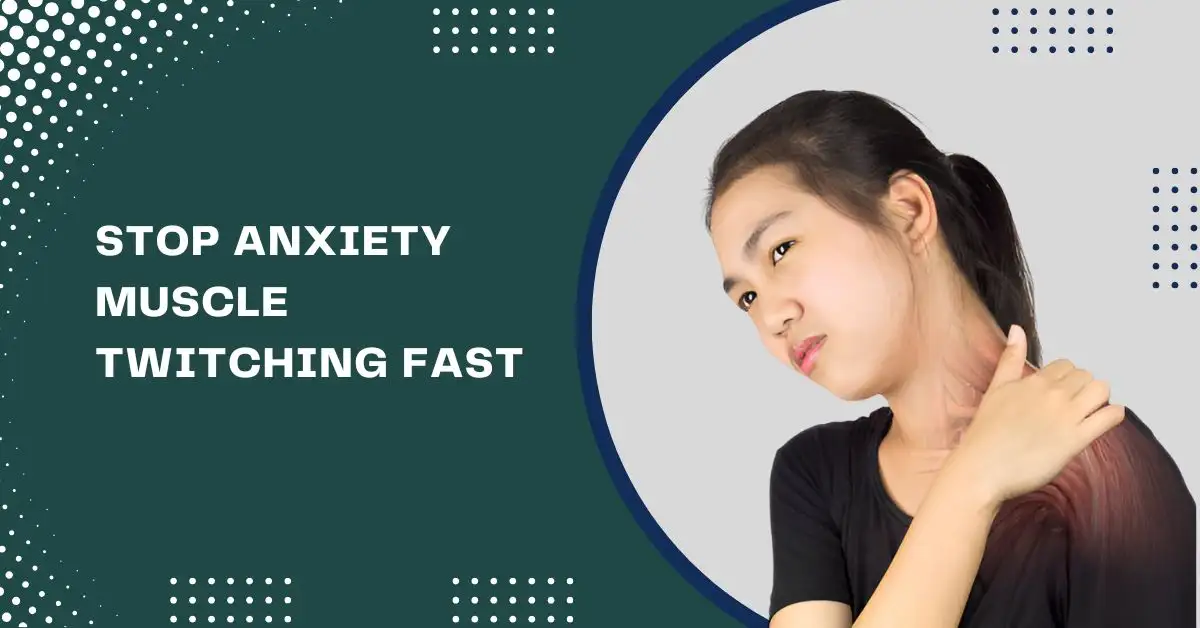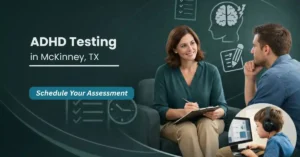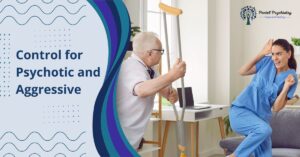How to stop anxiety muscle twitching is a question many people ask when their body starts acting up. You might feel your eye jump. Or your arm. Or your leg. It can be sudden and strange. Most of the time, it’s not a serious issue. It often comes from stress or worry. When you feel anxious, your body gets tense. Your nerves stay on high alert.
This can lead to muscle spasms or minor cramps. You might also feel shaky or restless. These signs can feel scary, but they are common. Your body is just reacting to stress. This guide will help you see why this happens and how to stop it.
You’ll learn what to look for, what helps, and when it’s smart to talk to a doctor. You’re not alone, and you can take steps to feel better fast.
What Is Anxiety Muscle Twitching?
Muscle twitching from anxiety can feel strange and even scary. It occurs when small muscles in your body move without your conscious effort. These twitches are often harmless, but they can be annoying or even alarming if you don’t know what’s causing them.
Why Does It Happen?
When you are anxious, your body goes into “fight or flight” mode. Your nervous system thus reacts to stress. It sends signals through your body to prepare for danger, even if there is no real threat.
As a result, your muscles are excited. This excitement, accompanied by excess adrenaline in your system, can cause small, fast muscle contractions, known as fasciculations. They may feel in your legs, arms, mouth, or even eyelids.
Where Can You Feel Anxiety Muscle Twitching?
Muscle twitching from anxiety can show up in many places, such as:
- Legs
- Shoulders
- Back
- Hands
- Eyelids
The feeling might last a few seconds or come and go throughout the day. Some people also notice twitching when they’re resting or trying to fall asleep.
Is Anxiety Muscle Twitching Dangerous?
Most of the time, it’s not. These twitches are a physical symptom of anxiety, just like a racing heart or sweaty palms. They don’t mean you have a serious health problem.
Still, if twitching worsens, spreads across your body, or accompanies other symptoms like weakness or numbness, it’s a good idea to consult a doctor. This helps rule out other potential causes, such as muscle fatigue, magnesium deficiency, or neurological issues.
In most cases, though, this is your body’s way of saying it’s overwhelmed, and it needs a break.
Why Anxiety Causes Muscle Twitching
When you feel anxious, your body enters a state of alertness. This is often referred to as the fight-or-flight response. It’s how your nervous system prepares you to deal with stress or danger. During this response, your muscles tense up. This tension can cause small muscle twitches or spasms that you might notice in different parts of your body.
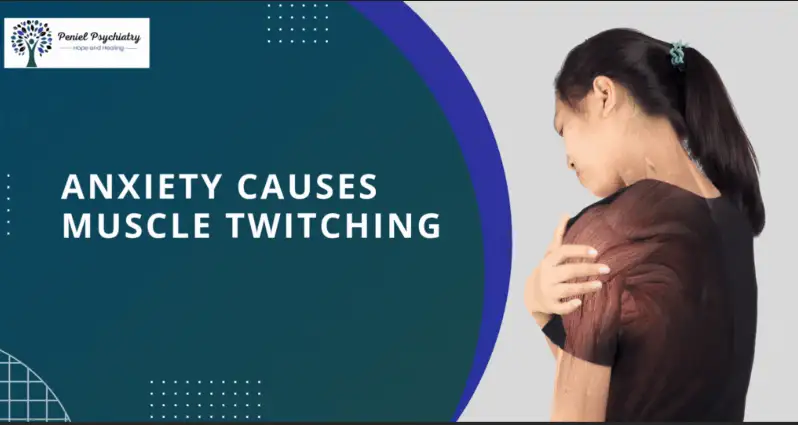
Nerves Become Overactive
Anxiety also makes your nerves overstimulated. When nerves send too many signals to your muscles, you feel those quick, involuntary twitches. This is a common physical symptom linked to stress and anxiety.
Effects of Sleep and Hydration
Chronic anxiety may disturb your sleep. Poor sleep makes your muscles tired and relax more. At the same time, anxiety may cause you to forget to drink enough water. Your dehydration can cause muscle cramps and twitching.
Hormones at Work
Stress hormones, such as adrenaline and cortisol, play a significant role in this process. These hormones help your body handle stress, but when they stay high for a long time, they cause muscle tension and twitches.
Anxiety affects your muscles through tension, nerve overstimulation, poor sleep, and hormone changes. All of these together can lead to the muscle twitching that many people feel when stressed.
Reading this article before proceeding to the next part is an effective way to reduce your heart rate during a panic attack.
How to Tell If Anxiety Is the Cause
Sometimes what feels like stress-related muscle twitching isn’t a sign of a serious issue. You can use a simple checklist to see if anxiety is the cause. Watch your body and note when twitches happen. Check for signs of tension or lack of sleep. This helps you know if these minor spasms are from anxiety.
Checklist to Spot Anxiety Muscle Twitching
Here is a checklist to help you figure out if these twitches are linked to anxiety. Read each point and see if it matches your experience.
- Does it happen during or immediately after stressful moments? Anxiety’s physical symptoms often show up when you feel tense or during panic attacks.
- No severe pain, weakness, or numbness? If you feel only quick twitches without other significant issues, it’s likely due to stress rather than a muscle disorder.
- Does it get worse when you drink too much coffee or skip sleep? Caffeine and lack of sleep can fuel anxiety and muscle twitching. Notice if cutting back on coffee or improving sleep helps.
- Do you experience other signs of chronic stress, such as restlessness or tension? Muscle cramps or body tension often come with other anxiety-related issues.
Use this checklist to guide you. If most points match, anxiety is probably behind the twitching. However, this is not a medical test. If you experience severe pain, weakness, or are concerned about another issue, consult a doctor. If you are uncertain, always see an online psychiatrist.
How to Stop Anxiety Muscle Twitching: 10 Helpful Tips
Here are 10 simple steps you can try to alleviate stress-related muscle spasms. Each tip uses easy words. Follow these ideas to calm your body. You can share this list as a carousel or a short Reel.
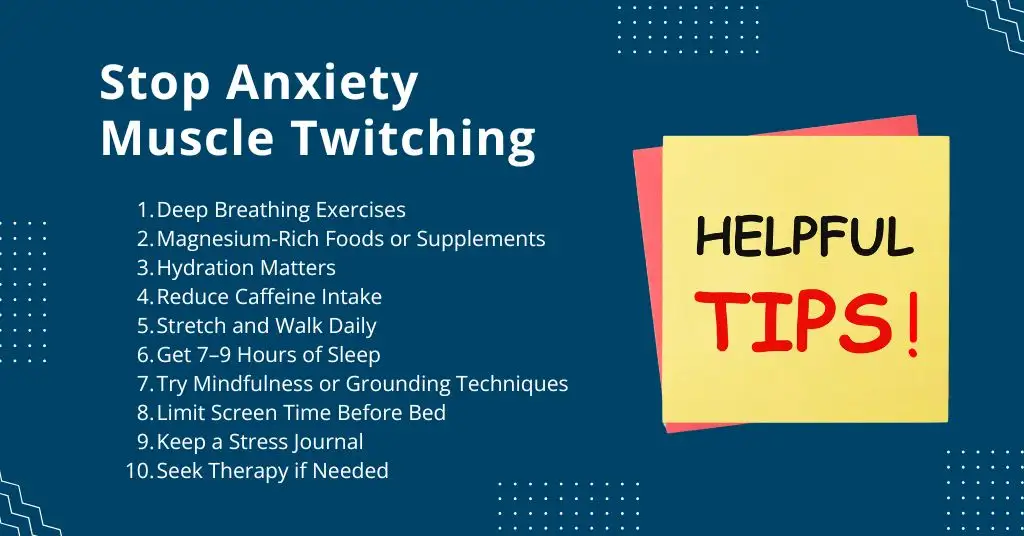
1. Deep Breathing Exercises
Sit or lie down in a quiet spot. Breathe in slowly through your nose for four counts. Hold for two counts. Breathe out through your mouth for six counts. Repeat five times. This helps lower muscle tension and eases stress.
2. Magnesium-Rich Foods or Supplements
Magnesium helps muscles relax. Eat spinach, pumpkin seeds, or almonds. If you prefer supplements, look for magnesium citrate or glycinate. Talk with a doctor before adding any new supplement. This can help if you have a magnesium deficiency.
3. Hydration Matters
Your muscles need water to work well. Carry a bottle of water and sip often. Aim for at least eight cups a day. Dehydration can cause cramps and muscle fatigue. Keeping fluids up can reduce twitching.
4. Reduce Caffeine Intake
Too much caffeine can make your nerves jumpy. Swap coffee for decaf or herbal tea. If you drink energy drinks, try a glass of water instead. Cutting back on caffeine can lower involuntary muscle movements.
5. Stretch and Walk Daily
Take short breaks to stand and stretch every hour. Reach arms overhead and roll your shoulders. A quick five-minute walk helps blood flow and eases tight muscles. These simple moves can prevent stress-related muscle twitches.
6. Get 7–9 Hours of Sleep
Poor sleep can worsen anxiety and muscle tension. Set a bedtime that lets you get enough rest. Establish a calm bedtime routine, such as reading or gentle stretches. Good sleep supports muscle recovery.
7. Try Mindfulness or Grounding Techniques
Sit silently and focus on the present moment. Notice the sensation of your feet on the floor or your breath. You can press your muscles together to feel the feeling of grounding. These Mind Flowers practice the stress and quiet to calm the nerves and focus attention.
8. Limit Screen Time Before Bed
Avoid using the phone or computer, as their blue light can affect sleep. Try to stop using the screen at least one hour before going to bed. Read a book or listen to soft music instead. Good sleep means less unstable muscles.
9. Keep a Stress Journal
Write down worries before bed. Note the time, what you felt, and how your body reacted. Over time, this can show patterns in muscle twitching and anxiety. A stress journal helps you spot triggers and find relief.
10. Seek Therapy if Needed
Talking with a mental health professional can help you manage chronic stress. Therapists offer tools such as cognitive-behavioral therapy and relaxation exercises. Getting help early can reduce anxiety symptoms and related muscle spasms.
Use these tips to ease muscle twitching and calm your body. Feel free to turn each step into a slide or a short Reel. Share what works best for you and help others find relief, too.
When to See a Doctor for Muscle-Crushing Injuries
Most muscle twitches caused by anxiety are harmless and will go away on their own. However, twitching can sometimes be a sign of a more serious underlying problem. It’s essential to know when to seek medical help to ensure safety and receive the proper care.
Signs You Should Get Checked
If other symptoms accompany your muscle twitching, it’s a good idea to consult a doctor. Watch out for:
- Muscle weakness that doesn’t go away
- Slurred speech or trouble talking clearly
- Severe fatigue or feeling very weak
These symptoms might mean there’s more going on than just anxiety. They could be signs of a nerve or muscle condition that needs treatment.
Even if you are unsure, it’s better to get checked. Consulting with a healthcare professional can provide you with peace of mind. They can help figure out if your twitching is linked to anxiety or something else.
Remember, a primary diagnosis can help you take proper care more quickly. If you notice these warning signs or your twitching worsens, book an appointment with us today.
Quick Fixes vs. Long-Term Solutions
Muscle twitching from anxiety can be tough to handle. Sometimes, you want fast relief. At other times, you need to cultivate habits that will benefit you in the long run. Understanding the distinction between quick fixes and long-term solutions can significantly impact your ability to manage symptoms effectively.
Quick Fixes for Immediate Relief
When you feel a muscle twitch or tension starting, quick relief can help calm your body fast. Simple breathing exercises are one of the best tools. Taking slow, deep breaths helps lower stress and reduce muscle tension. You can also try gentle stretching or a quick walk to relax
tight muscles. These small actions don’t fix anxiety, but can stop twitches from getting worse right away.
Long-Term Solutions to Reduce Anxiety
For lasting results, you need to build habits that support your body and mind. Good sleep is key, as it helps muscles recover and nerves calm down. Regular exercise can reduce anxiety and improve muscle health. Peniel Psychiatry offers tools to manage anxiety at its root. Over time, these changes can lower the frequency of muscle twitches and enhance overall well-being.
Helpful Resources to Get Started
If you need support, many apps can guide you through breathing exercises or mindfulness practices. Therapy services are available online and in person to help you manage anxiety long-term. Finding the right resources can make your journey easier and more effective.
Frequently Asked Questions (FAQs)
How to stop tense muscles from anxiety?
To stop tense muscles caused by anxiety, try deep breathing exercises and gentle stretching. Regular physical activity and good sleep also help relax your muscles. Staying hydrated and practicing mindfulness can reduce overall muscle tension.
How do you treat muscle weakness from anxiety?
Muscle weakness linked to anxiety can improve with relaxation techniques and steady exercise. Therapy can help manage anxiety, which reduces symptoms like weakness. Ensure you get enough rest and eat a balanced diet to support your muscles.
Can dehydration cause muscle twitching during anxiety?
Yes. Anxiety can make you forget to drink enough water. Dehydration can lead to muscle cramps and twitching. Drinking enough fluids daily helps keep your muscles working well.
When should I see a doctor about muscle twitching?
If twitching persists, lasts a long time, or is accompanied by weakness, numbness, or pain, it’s best to consult a doctor. These signs may indicate a different health issue that requires attention.
How to deal with anxiety and muscle tension?
Practice deep breathing, progressive muscle relaxation, regular exercise, and stress-reduction techniques to manage stress effectively. Staying hydrated and sleeping well can also ease muscle tension caused by anxiety.
How to stop annoying muscle twitches?
Limit caffeine, stay hydrated, manage stress effectively, and get sufficient sleep. Gentle stretching or massage may help. If twitches persist or worsen, consult a healthcare professional.
How to cure anxiety twitches?
Reduce anxiety through therapy, mindfulness, or medication if needed, regular physical activity, and proper rest. Addressing the root cause of anxiety often reduces or eliminates twitches.
Final Thoughts
Muscle twitches caused by anxiety are widespread. They can feel strange, but most of the time, they are harmless and manageable. Remember, your body is reacting to stress, and with the proper steps, you can ease these symptoms.
If you know someone who deals with anxiety and muscle twitching, feel free to share this post. It might help them understand what’s happening and find relief as well.
For more helpful tips and advice, consider following Peniel Psychiatry. Sharing this with your friends can make a real difference.

